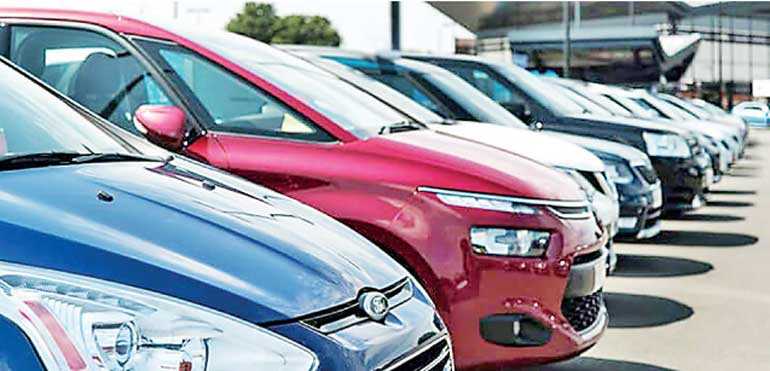Thursday Feb 19, 2026
Thursday Feb 19, 2026
Saturday, 16 May 2020 00:04 - - {{hitsCtrl.values.hits}}
 Cars sales face an uncertain future due to import restrictions
Cars sales face an uncertain future due to import restrictions
By Charumini de Silva
The Vehicle Importers Association of Sri Lanka (VIASL) wants the blanket ban to be lifted and for the Government to consider introducing other restrictions including higher margin on LCs.
“Total suspension of imports isn’t the best course when the Government has the option of other restrictive measures such as higher margin on Letters of Credits as it was the case two years ago,” VIASL President Ranjan Peiris told the Daily FT.
VIASL is to submit a formal request for relaxation of the total ban to the Finance Ministry shortly.
Despite expressing concern, Peiris said importers understood the predicament of the Government, which was keen to preserve foreign reserves. VIASL however hopes the Government would consider relaxing the ban by end of next month.
“The COVID-19 pandemic has almost all economies navigating in uncharted waters. Right now the priority of all citizens is a healthy nation. We understand the rationale behind the Government decision to impose an import restriction was to curtail foreign currency outflow in this critical time. It is almost two months after the lockdown was imposed and we want to give it another month to see what the Treasury is planning to implement,” Peiris said.
According to the Central Bank, expenditure on personal vehicle imports in 2019 declined significantly by 48.2% to $ 816 million from the record high level of $1,574 million in 2018. This was due to the impact of policy measures implemented during the latter part of 2018 to discourage imports of personal motor vehicles. Responding to policy measures, the importation of personal vehicles has decelerated since December 2018.
VIASL Chief said formal motor trade had come to a halt during the past one-and-a-half months due to the lockdown but they were still optimistic with the gradual curfew relaxation measures announced by the Government.
“We had zero sales during the lockdown period and there will be an immediate drop in sales of all our members. However, we are hopeful that business will pick up along with other industries within the next three months,” he said.
Peiris also noted that the prices of all vehicles had increased by 10% to 15% as a result of the import restrictions imposed to prevent forex outflow and currency fluctuation. “With the depreciation of rupee, the prices of all vehicles including small vehicles less than 1000 engine capacity have increased,” he added.
As a result, most popular Japanese vehicles have gone up in prices by Rs. 200,000 to 500,000 at present. Accordingly the new prices are as follows: Toyota Vitz Rs. 4 million to Rs. 4.5 million, Toyota Passo Rs. 3.8 million to Rs. 4.2 million, Toyota Premio Rs. 9 million to Rs. 9.5 million, Toyota Axio Rs. 7.5 million to Rs. 7.8 million, Toyota Rise Rs. 7 million to Rs. 7.5 million, Toyota CHR Rs. 8 million to 8.5 million, Honda CRV Rs. 10.2 million to Rs. 10.25 million, Toyota Double Cab Rs. 10.2 million to Rs. 10.25 million and Suzuki Every Van Rs. 3.2 million to Rs. 3.5 million.
“It is understood that purchasing of a new vehicle will not be the priority for many people going forward with the possibility of reduced cash flow in the coming months. Most will sell vehicles subject to an average price increase, while there will still be dealers who will opt to trade the existing vehicle stocks at the previously-assigned prices to ensure that the income is steady,” Peiris said.
He said there was sufficient imported stock of vehicles at present in the country with more cleared from the Port premises last week. Peiris also opined the situation would also create a good opportunity for the second-hand vehicle market.